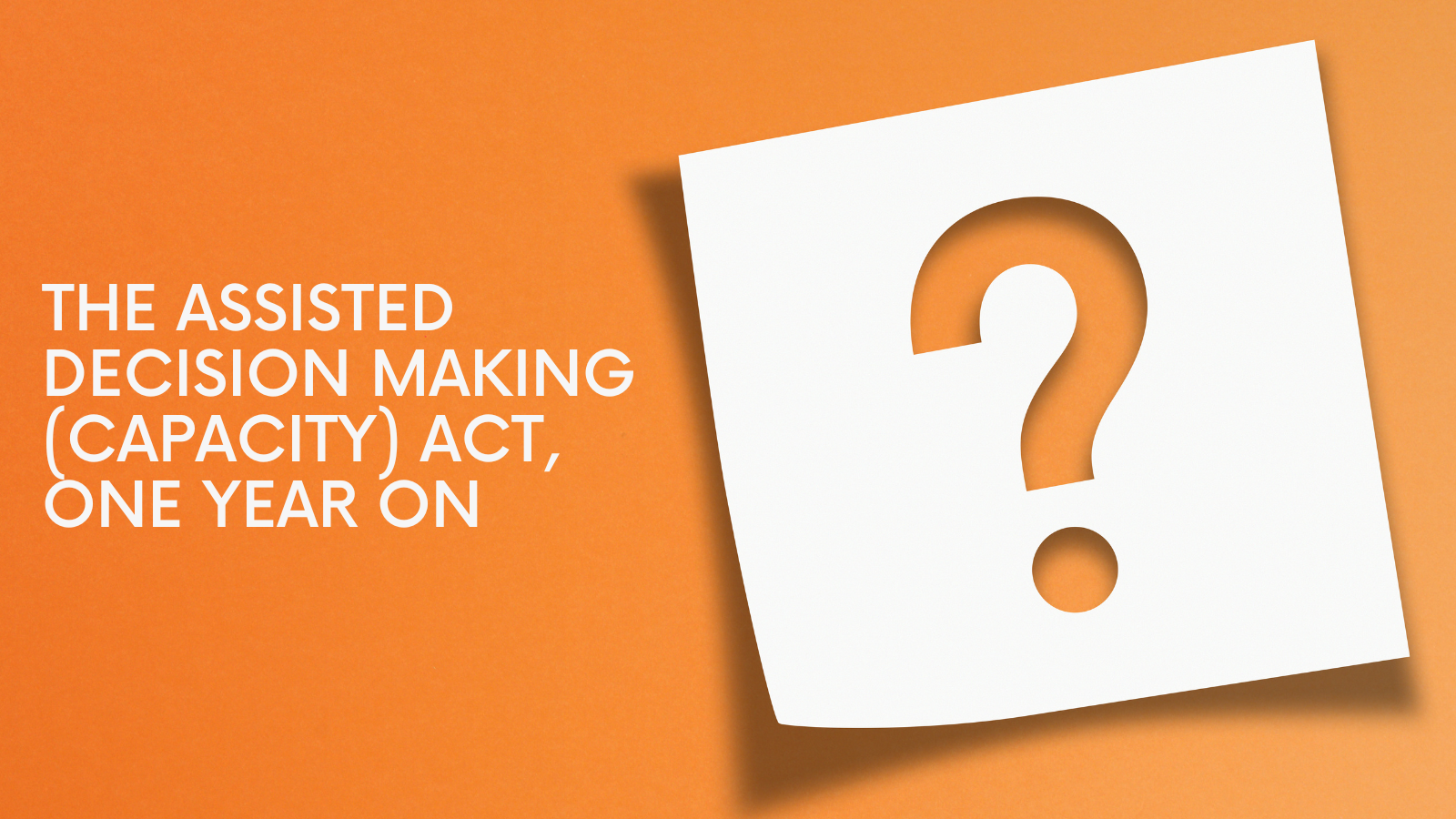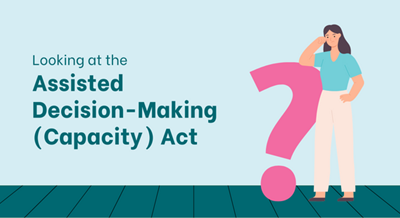
26 April 2024 marks one year since the Assisted Decision-Making (Capacity) Act came into effect. Here we revisit what this law is about and some ways in which it’s relevant to mental health.
What is assisted decision-making?
“Assisted decision-making” means we are supported and enabled to make choices and decisions about our lives at times when we may be unable to do so on our own. It can take different forms, which can include:
- receiving information in a way that is understandable to us
- getting information about the choices available to us
- ensuring there is enough time and support to consider our choices
- having a trusted person in place to help us make decisions.
It can also include making legal arrangements to help us with decision-making now or in the future.
Support to make decisions might only be needed to help with specific areas of our lives. For example, a person might be able to make decisions about healthcare independently, but may need help to make decisions about their finances. Someone also may only need support for a limited amount of time; for example, due to mental health reasons. Or a person may need ongoing or increasing decision support; for example, if someone has a progressive condition, such as dementia.
Mental Health Reform has produced a short, animated video explaining key parts of the law, co-created with people with experience of mental health difficulties; watch the Mental Health Reform video here.
What is the Assisted Decision-Making law about?
This law is a step forward in strengthening people’s human rights in Ireland, and especially the rights of people with disabilities. It is based on a key human right set out in the United Nations (UN) Convention on the Rights of Persons with Disabilities: the Right to Equal Recognition Before the Law. This includes the right to make decisions about important parts of our lives, and to access support to make decisions if we need it.
At different stages in our lives, for a variety of reasons, we may have difficulty making decisions about important issues. This might be due to physical or mental health reasons, or because of an intellectual disability.
Under the law, assisted decision-making means that our will and preferences are at the centre of decisions about our lives, even at times when we may be unable to communicate them clearly by ourselves. A person’s “will” is about their values, beliefs and goals, and a person’s “preferences” means a greater liking for one choice over another.
The Assisted Decision-Making law sets out that it should be presumed that we all have the capacity to make decisions about things that affect us. It also sets out that we have the right to help and support to make decisions when we need it. These may include decisions about our healthcare, our personal welfare, our property or personal affairs.
If we are unable to make a decision about something at a particular time, the law sets out that those around us, including health professionals, need to:
- respect our will and preferences
- consult with important people in our lives
- take action only when it is necessary
- intervene in the least restrictive way to our rights and freedoms.
What are the decision support arrangements I can make?
The law also sets out a legal framework for assisted decision-making arrangements. There are five different arrangements that people can make. These are based on different levels of support, and two of them - the Advance Healthcare Directives and Enduring Power of Attorney - are for future planning.
A decision-making assistance agreement
This is the lowest level of support. You appoint a person to help you make a decision about particular things; for example, by helping you get and go through relevant information. However, it is still you who makes the decision. You learn more about decision-making assistance agreements here.
A co-decision-making agreement
This is the middle level of support. You appoint a person to jointly make decisions with you about particular things. You can have different arrangements and different co-decision makers for different life decisions. You can find more information about co-decision making agreements here.
A decision-making representation order
This is the highest level of support. In this case, a court appoints someone to make decisions about certain things on your behalf. You can find more information about decision-making representatives here.
An Advance Healthcare Directive (AHD)
An AHD is an arrangement for healthcare decisions. It allows you to set out what your preferences are for healthcare treatment in the future, if there is a time where you are unable to make healthcare decisions. You can include things you would prefer to be included in your healthcare, and things you want to refuse. You can also appoint a person to act on your behalf about these decisions if and when it is in use. You can learn more about advance healthcare directives here.
An Enduring Power of Attorney
This arrangement allows you to plan ahead for a time where you may be unable to make certain decisions for yourself. You can set out the decisions you would like to include which may be about personal welfare, property or personal affairs. You appoint a trusted person to act on your behalf on these decisions. You can learn more about powers of attorney here.
What about mental health difficulties?
This law applies to everyone. If we are experiencing mental health difficulties and or accessing mental health services, it should be presumed that we have the capacity to make our own decisions about things in our life.
Mental health services and professionals must follow the law and ensure they are respecting people’s decision-making rights. This includes supporting people to make decisions if they need help. For example, someone might need information in different formats, such as in Plain English, or to use a communication aid, to help them make a decision. A person might also need extra time to go through their options. If there are concerns about a person’s ability to make a particular decision at a particular time, they must follow the guidelines set out in the law. This includes upholding people’s decision-making arrangements where they are in place, and ensuring a person’s will and preference remains the focus of decision-making.
What about AHDs and mental healthcare?
AHDs can be made to future plan for mental healthcare treatment. This might include listing things like treatments or approaches that have worked well for you before with particular experiences or health difficulties. It can also include things that you know you do not want to happen; for example; receiving a specific medication for something. They are only used if a person is found to not have the capacity to make decisions about their healthcare for a time.
Mental health services must comply with any refusals of treatment in a valid AHD where they apply. They must also consider your preferences for treatment in planning your care. If you have appointed someone to act on your behalf in relation to the AHD, your treating team must engage with them to help them apply it.
There is one important exception to this in the law, as it is currently set out. If someone is involuntarily admitted to hospital due to risk of harm to themselves or others, a mental health service does not have to adhere to refusals of mental health treatment listed in an AHD. However, they should still give consideration to the AHD as an important indication of a person’s will and preference.
Where can I get more information?
-
The Decision Support Service
You can get more information about the Assisted Decision-Making law and the different decision-making arrangements from the Decision Support Service. This service was set up under the new law and its roles includes providing information to the public.
You can contact them by visiting the Decision Support Service's website here; calling them on (01) 2119750; or emailing queries@decisionsupportservice.ie.
-
Sage Advocacy
Sage Advocacy also provides more information: visit the Sage Advocacy website here. You can call Sage Advocacy on 01 536 7330 or email info@sageadvocacy.ie.
-
Information for family and carers
Family Carers Ireland has produced a practical guide for family members on the Assisted Decision-Making Act; the Family Carers Ireland guide can be viewed here. It is also launching a free legal advice service (CarerAid) for carers with queries related to the Act. For more information, visit the Family Carers Ireland website.
-
Legal Aid information
The Legal Aid Board provides information on legal aid available for legal processes relevant to some decision-support arrangements. For more information, visit the Legal Aid Board website here.
Mental Health, human rights and the law
Continue to…
Dance Movement Therapy initiative sees positive outcomes

